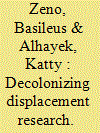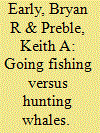| Srl | Item |
| 1 |
ID:
193498


|
|
|
|
|
| Summary/Abstract |
Over the past decade, there have been increasing numbers of displaced scholars from the Middle East and Africa who have come under sustained pressures and threats from their governments; only a few of them have been able to relocate to European and North American academia through scholarships and grants.1 Even these temporary solutions for displaced scholars rarely result in sustainable institutional solidarity in the form of permanent teaching or professorial positions. The lack of institutional support, coupled with discriminatory and racialized immigration policies, pushes these few fortunate scholars to either accept exploitative conditions perpetuated by the neoliberal economy or leave academia altogether to support their families. These challenges, along with draconian economic sanctions and restrictions imposed by the US Treasury Department Office of Foreign Assets Control (OFAC) on citizens of countries such as Syria, Sudan, Iran, and Cuba are only a snapshot of what displaced scholars endure on a daily basis while trying to do research, care for their families, and compete with scholars with privileged citizenship status for shrinking opportunities in the academic job market.
|
|
|
|
|
|
|
|
|
|
|
|
|
|
|
|
| 2 |
ID:
171984


|
|
|
|
|
| Summary/Abstract |
How economic sanctions are enforced undoubtedly affects their chances of success. Yet, to date, a lot remains unknown about how governments actually enforce their sanctions. To shed light on the ways governments enforce their sanctions, we conduct an empirically driven case study of how the lead agency for enforcing economic sanctions in the United States, the Treasury Department’s Office of Foreign Assets Control (OFAC), has enforced US sanctions from 2003 to 2018. Our study begins with an empirical exploration of how OFAC’s enforcement actions originate, what factors correlate with enforcement actions being taken, and what factors contribute to the financial penalties imposed as part of enforcement actions. We find that OFAC engaged in two distinct enforcement strategies during our period of analysis: a “fishing” strategy that involved taking a lot of enforcement actions and imposing small fines during the administration of George W. Bush and a “whale-hunting” strategy that involved pursuing fewer cases but imposing enormous fines during Barack Obama’s administration. Our analysis indicates that the shift in foreign policy emphasis from Cuba to Iran during the Bush administration and how that motivated new legislation to enhance penalties for violating sanctions paved the way for the OFAC to adopt its innovative whale-hunting strategy during the Obama administration. Our study also yields a wealth of new empirical insights into how the United States enforces its sanctions that can contribute to future theory-building efforts.
|
|
|
|
|
|
|
|
|
|
|
|
|
|
|
|